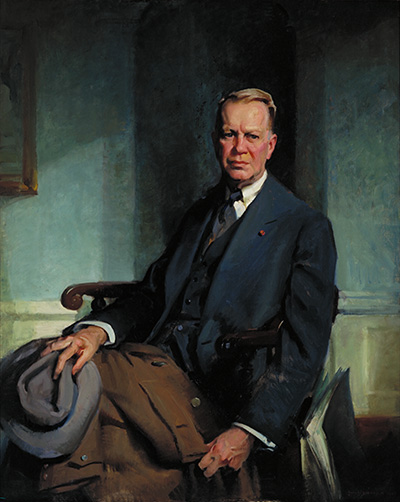Lewis Hill Weed

Lewis Hill Weed
- Artist:
- John C. Johansen
- Date:
- 1947
- Medium:
- Oil on canvas
- Dimensions:
- 53.5 x 42 in.
Lewis Hill Weed
1886-1952
Weed, a dean of the Johns Hopkins University School of Medicine, was born in Cleveland. He received his B.A. in 1908 and his M.A. in 1909, both from Yale University, and his M.D. from the Johns Hopkins University School of Medicine in 1912. After his graduation from medical school, Weed served two years as Arthur Tracy Cabot Fellow in charge of surgical research at Harvard University, under his former professor Harvey Cushing.
In 1914, he returned to Johns Hopkins as an instructor in the department of anatomy at the School of Medicine. After the United States entered World War I, Weed was tasked with directing a neurosurgical laboratory at Johns Hopkins. His success in this task led the school to appoint him as director of the department of anatomy in 1919. Weed’s research dealt largely with cerebrospinal fluid and with the development of the membranes that surround the central nervous system. He discovered the origin of the cerebrospinal fluid and mapped out its circulation, an accomplishment which led to a number of important clinical developments.
Weed served as dean of the medical school from 1923 until 1929, and as director of the school until 1946. As an administrator, Weed was effective in promoting research throughout the school and was a strong supporter of Johns Hopkins’ transition to a full-time clinical faculty program. Under his leadership, the medical school established and constructed the William H. Welch Medical Library, which merged the libraries of the hospital and medical school, and gave a home to the newly-established Institute of the History of Medicine. In 1939, Weed was appointed chairman of the division of medical sciences of the National Research Council. In 1947, he resigned his Johns Hopkins posts in order to devote more attention to this position.
In recognition of his accomplishments and his wartime service, Weed received many honors. He was granted honorary doctorates from eleven universities in the United States and England, and earned the Presidential Medal of Merit and the Order of the British Empire. He was elected a member of the American Philosophical Society in 1942.
"*" indicates required fields
